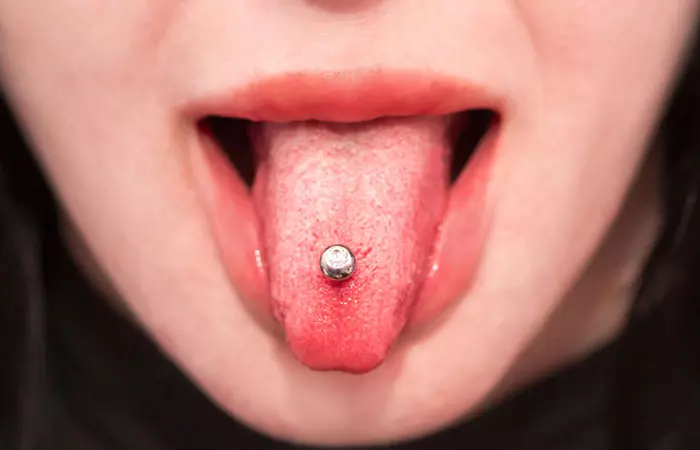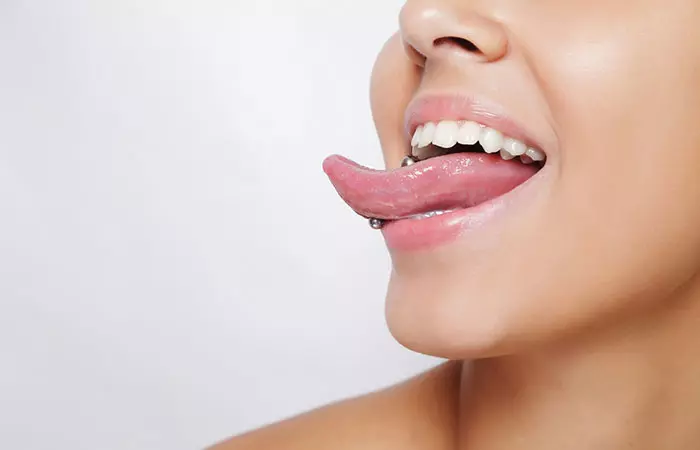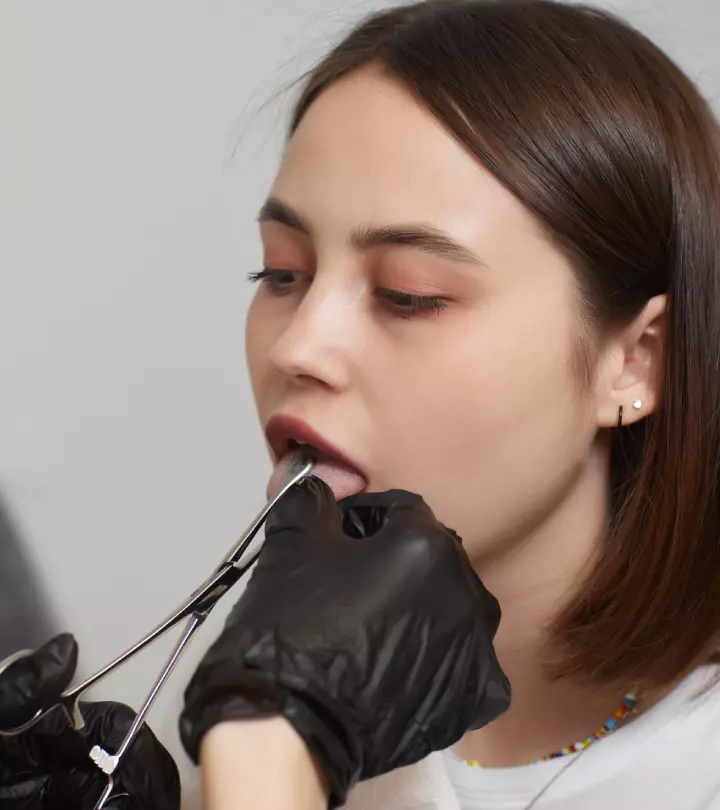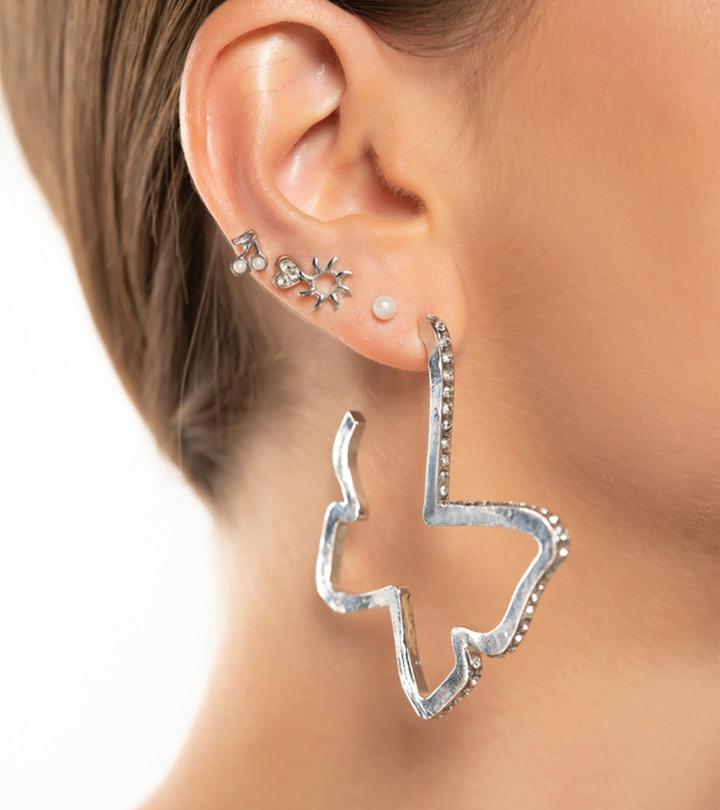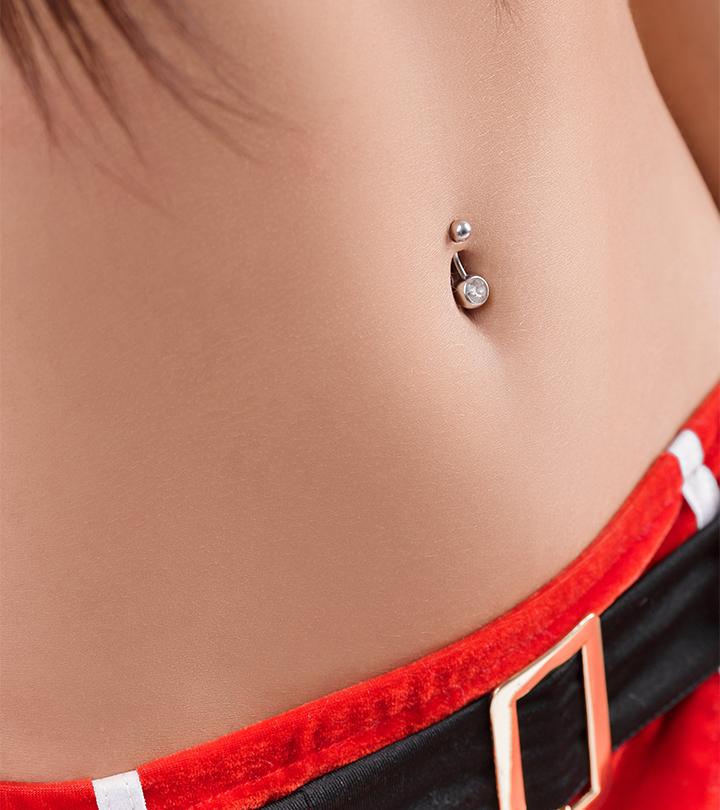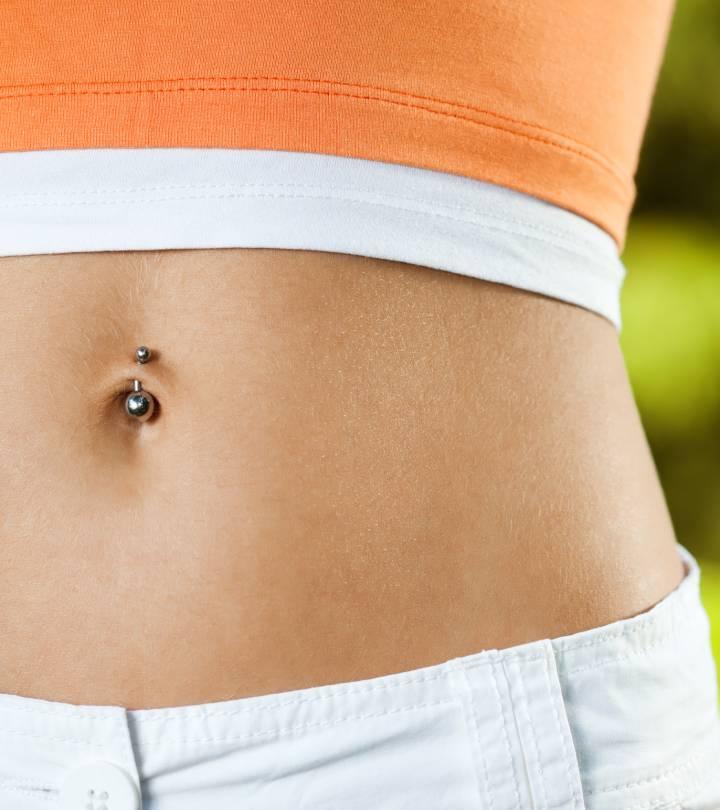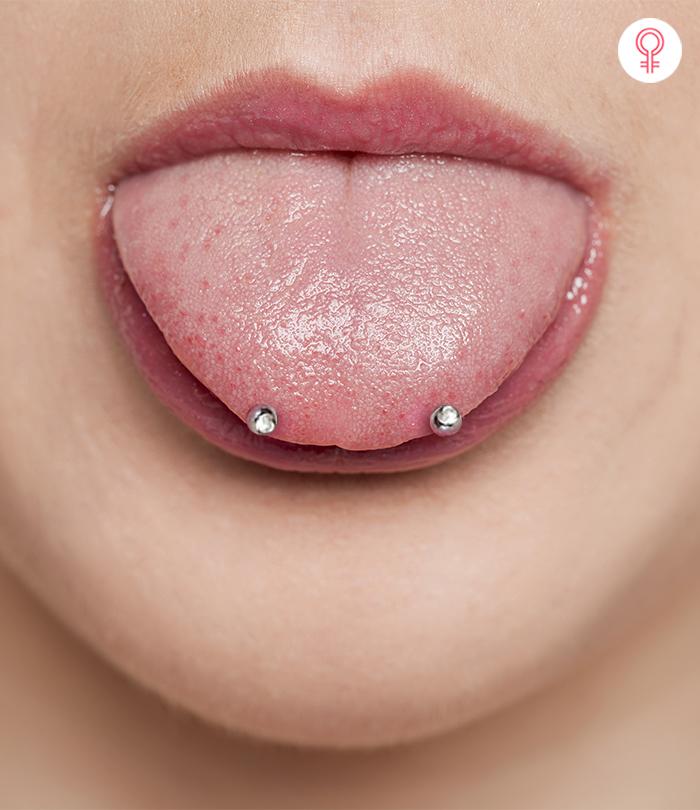How Long Does It Take For A Tongue Piercing To Close?
Discover the factors that influence the closure rate of this bold and edgy piercing.

Image: Shutterstock
Getting a tongue piercing can be cool. But are you wondering how long it takes a tongue piercing to close? While some individuals may experience rapid piercing closure within hours of removing their jewelry, others may experience it a few months later. So, whether you want to repierce the piercing or seal it forever, this article is for you. Here, we will tell you how you can deal with this process in a safe manner. Continue reading to learn how long it takes to close a piercing, the various factors that affect this closure, and more.
In This Article
Do Tongue Piercings Close?
Yes, tongue piercings can close once the jewelry is taken out. Some piercings may close within a few hours or days, whereas others may close within weeks or months. The closure in both cases may depend on the body’s healing mechanisms, which can lead to the formation of new tissue (1).
 Pro Tip
Pro TipIt is established that tongue piercings close. But how long do they take to close? Find out in the section below.
How Long Does It Take A Tongue Piercing To Close?
The closure time can vary based on several factors, such as the size of the piercing hole, the individual’s body chemistry, and the age of the piercing. For instance, a new piercing may close within a few hours or days, whereas an older piercing may take months or even years to close.
Additionally, your immune system and oral hygiene play a key role in the piercing’s closure rate. Plus, the blood vessels present in the tongue may force the wound to close faster than piercings on other parts of the body.
It is important to note that everyone’s body is different and the closure rate and process may differ from person to person. It is important to seek personal advice from an experienced piercer or healthcare provider if you are thinking about getting your tongue piercing removed and have concerns about the closure time.
The healing process also plays an important role in the closure rate. Check out the next section to know more.
How Does The Healing Process Affect Closure Rate?
The different stages in the healing process may influence the closing times in the following ways:
- Early Healing Phase
This stage happens during the first few days after the process where your tongue is extremely sensitive to any kind of contact. Your body may initially respond to the piercing by swelling, followed by clot formation at the site of the injury. You may feel tempted to fidget with the hole. Refrain from doing so as it may increase the risk of infection and cause a little delay in closure times while the body starts the healing process (1).
- Primary Healing Phase
This phase generally lasts between a few days to several weeks where your body stops seeing your piercing as an injury that requires healing. It will accept it as a foreign object and send antibodies to the piercing site to destroy any bacteria and support the surrounding area (1). While the swelling and irritation may have subsided, the inside of the wound would still need to heal.
- Maturation Phase
Depending on the size and severity of the wound, this phase lasts between weeks to months. The newly generated tissue strengthens and remodels during the maturation period, gradually enhancing the integrity and look of the piercing site (1). When further healing and tissue maturation occurs, the closing timeline may continue to decrease. However, in some cases, the final closure and complete restoration of tissue function may take longer, especially for larger wounds.
 Pro Tip
Pro Tip
Understanding how the healing period impacts the closure time may help you take the necessary steps required to reopen the piercing. Scroll down below to know more.
What To Do If Your Tongue Piercing Hole Has Closed Up
If piercings are left without jewelry for a long time, they often close up. Here is what you can do if your tongue piercing hole has closed up and you want to reopen it:
- Check and see if there is a little opening or not as it may appear closed at times and can be reopened with gentle pressure.
- If the hole is open, you can use your jewelry to see if it goes through. If not, don’t force. Instead, consult a qualified piercer. They may repierce the same area or create a new piercing nearby.
- Follow the tongue piercing aftercare instructions provided by your piercer.
- Avoid twisting the piece of jewelry as it may lead to allergic reactions or severe trauma (2).
- You may apply a cold compress to minimize swelling if the region surrounding the closed piercing is sore or swollen (3).
- Analyze why the piercing became closed. If it resulted from neglect or improper maintenance, resolve to take better care of any piercings you get in the future.
If you want your piercing to close safely and don’t want to reopen it again, here is what you can do:
- If you are closing a new piercing, clean it frequently with saline solution or salt water twice daily to avoid complications.
- Keep an eye out for signs of infection such as excessive redness, pain, warmth, or yellow or green discharge from the piercing site. Seek medical attention if you experience any of these signs (4).
- If your piercing still remains open, you may consult a doctor who may stitch it up.
A YouTuber shared her experience of re-piercing her tongue piercing in her vlog. She said, “I’m using a regular tongue ring. I’m trying to use my thumb to push it beyond. I did it. It wasn’t that bad (ⅰ).”
How long it takes a tongue piercing to close depends on various factors. That said, the individual’s healing ability and the piercing’s age ultimately determine the closure rate. If you want to reopen your piercing, you may try inserting the jewelry to see if it goes in. If you are unable to do so, you can always consult your piercer. However, if you want to close your piercing forever, clean it daily and monitor it to ensure it closes properly.
Frequently Asked Questions
Can you vape after a tongue piercing?
Vaping or smoking of any kind is not recommended after getting a fresh tongue piercing as it may slow down the healing process and increase the risk of infection.
Is the closure time for a tongue piercing different for various jewelry types used?
Yes, the gauge and shape of the jewelry will determine the closure rate of the piercing. For instance, shorter barbells might close more quickly as compared to rings. Additionally, wearing jewelry with the wrong gauge may force you to take the jewelry out before it heals, which may speed up the closure process.
Are there lifestyle factors or habits that may accelerate or delay tongue piercing closure?
Yes, lifestyle choices, such as smoking, vaping, or drinking alcohol, may cause inflammation and hinder the healing process (1). Practicing a good oral hygiene routine, avoiding excessive oral trauma, and following proper aftercare instructions may accelerate tongue piercing closure.
Can tongue piercing closure be affected by dietary choices, such as spicy or hot foods?
Yes, consuming hot acidic or spicy foods can irritate the piercing site and cause pain and inflammation, increasing the chance of closure (5).
Can tongue exercises or movements speed up or slow down the closure of a tongue piercing?
Yes, anecdotal evidence suggests that tongue piercing exercises and movements may have an impact on how quickly the piercing closes. Over-manipulation can irritate the piercing site, which can slow down the healing process.
Key Takeaways
- The closure time for tongue piercings may depend on factors such as the individual’s body chemistry and the piercing’s age.
- Individuals who want to open their closed piercing can consult their piercer who may suggest re-piercing the same hole or creating a new one near the original site.
- Those who want to close their piercing permanently must cleanse it twice daily and watch out for any signs of infection.
The piercing’s age and taking out the jewelry may increase the risk of a closed piercing. But how long does it take? Check out this informative video to gain more insight into this process.
Personal Experience: Source
StyleCraze's articles are interwoven with authentic personal narratives that provide depth and resonance to our content. Below are the sources of the personal accounts referenced in this article.
(ⅰ) How to Re Pierce Your Tongue No Needles Just Your Tongue Ring
https://www.youtube.com/watch?v=fwoB0SVnNmo
References
Articles on StyleCraze are backed by verified information from peer-reviewed and academic research papers, reputed organizations, research institutions, and medical associations to ensure accuracy and relevance. Read our editorial policy to learn more.
- Factors Affecting Wound Healing
https://www.ncbi.nlm.nih.gov/pmc/articles/PMC2903966/ - SUGGESTED AFTERCARE FOR BODY PIERCINGS
https://safepiercing.org/aftercare/ - Cold and compression in the management of musculoskeletal injuries and orthopedic operative procedures: a narrative review
https://www.ncbi.nlm.nih.gov/pmc/articles/PMC3781860/ - CARING FOR NEW PIERCINGS
https://www.aad.org/public/everyday-care/skin-care-basics/tattoos/caring-for-pierced-ears - Oral Piercing: A Pretty Risk—A Scoping Review of Local and Systemic Complications of This Current Widespread Fashion
https://www.ncbi.nlm.nih.gov/pmc/articles/PMC10177791/
Read full bio of Eshna Das
Read full bio of Shreya Mukherjee




